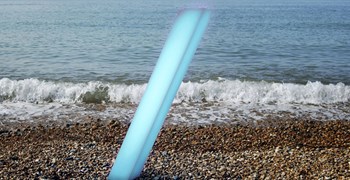Curators say mystery sculpture of veiled lady discovered in storeroom "counterbalances negative portrayal of women"
This article originally appeared on Culture24.
"Ornate charm" of newly-discovered sculpture counterbalances negative portrayals of women in historic art, says curator
 A Veiled Lady has faced curators in eerie circumstances in Cumbria© Kendal Museum
A Veiled Lady has faced curators in eerie circumstances in Cumbria© Kendal MuseumDespite the insistence of their visitor that a “veiled lady” existed in the collection of the Kendal Museum in Cumbria, curators were unable to recall or find any documentation matching the suspected item in their storerooms. It only materialised two days later, when Carol Davies, the curator manager, discovered a set of mysterious, unlabelled boxes in the downstairs store.
 This Veiled Vestal, from around 1848, is at Chatsworth House in Derbyshire© Wikimedia Commons
This Veiled Vestal, from around 1848, is at Chatsworth House in Derbyshire© Wikimedia Commons“It was so odd. She was very beautiful.
“I’m not saying there was anything ghoulish or spooky about it, but it was almost as if there was a sixth sense, as if I had been meant to choose that box.
“We unwrapped her and for the first time she saw the light of day.”
 Originally in Rome, copies of The Dying Gaul exist in collections across the world© Johnbod / Wikimedia Commons
Originally in Rome, copies of The Dying Gaul exist in collections across the world© Johnbod / Wikimedia CommonsCurators have positioned the lady next to a small-scale model of another sorrowful-yet-beautiful figure, The Dying Gaul, on a windowsill. Her garland, they believe, expresses the kind of femininity and purity the museum needs.
“Lots of people have complimented her on her beauty and how she has a serene aura about her,” says Davies, lauding the lady’s “ornate charm.”
“We have a lot of items which portray women in a negative light – violent, torturous, objects which have been used on women throughout history.
“But The Veiled Lady is an object of comeliness and has a calming effect, so she counterbalances that.”
What do you think? Leave a comment below.
Three galleries to see great sculpture in
Bury Art Museum and Sculpture Centre
Highlights from the art collection include 'Calais Sands' and 'Ehrenbreitstein' by JMW Turner; 'Spring Morning, Haverstock Hill' by Sir George Clausen; 'Different Horizons', blue neon light piece by Maurizio Nannucci; and 'Revolution of the 19th Century' and 'Essential Elements' by Pavel Büchler.
Tate Modern, London
Continuing Tate Modern’s acclaimed reassessments of key figures in modernism, Alexander Calder: Performing Sculpture reveals how motion, performance and theatricality underpinned the artist's practice, bringing together major works from museums around the world, as well as showcasing his collaborative projects in the fields of film, theatre, music and dance.
Yorkshire Sculpture Park
The immersive exhibition in YSP’s Chapel and Underground Gallery features work from across Viola’s career. Considering the universal themes of life, death, love and spirituality, Viola examines facets of the human condition, holding a starkly intimate mirror to our strength, our fragility, and the impulses and inevitabilities that unite us, giving tangible visual form to abstract psychological and metaphysical experiences.











